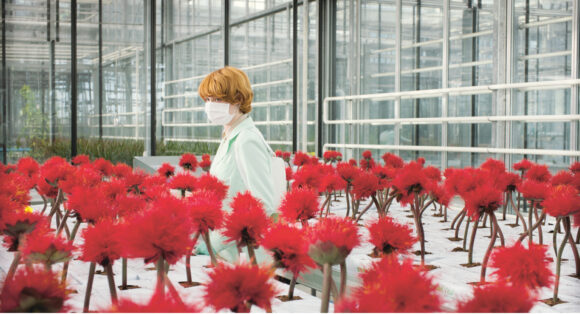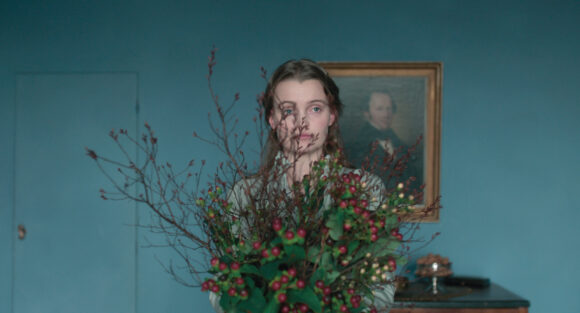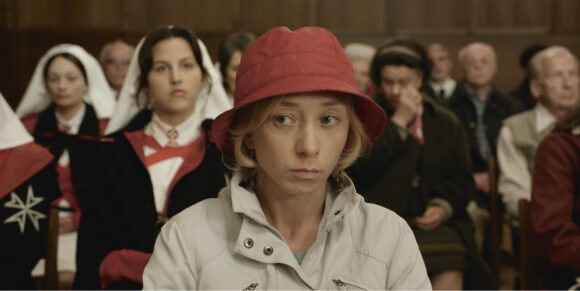Sometimes the only sure thing is uncertainty. In film after film, Jessica Hausner portrays the mysterious – and perhaps illusory – nature of our shared connections and beliefs, as the women in her films strive for some kind of escape. In Hausner’s first feature, Lovely Rita (2001), a teenager in an Austrian town is so bored and dissatisfied that she – in rather punk fashion – sabotages a school play, hooks up with a bus driver and tries to run away with her sickly next-door friend. Finally, the coup de grace: she murders her mother and father. The body count in the candlelit world of Amour Fou (2014) is comparable but the rationale is loftier: a hausfrau enters a suicide pact with a needy poet – inspired by German Romantic Heinrich von Kleist – in pursuit of transcendent communion. The paralysed pilgrim (Sylvie Testud) in the Jacques Tati-esque religious subculture of Lourdes (2009) embraces the apparent miracle that allows her to walk away from her wheelchair. And in Hausner’s most recent feature, Little Joe (2019), a scientist (Emily Beecham) works in a lab cultivating a plant intended to foster feelings of happiness – as a relief from the troubles of the everyday, which for her mean the tangled burdens of work, family and love.

Little Joe, 2019. Courtesy of Jessica Hausner, Coop99, Vienna and Coproduction Office, Berlin
To the variously high stakes of her characters, Hausner applies a de-dramatised style, hushed tones, and a steady ambiguity, whether the question is the existence of God or what is going on with those lurid plants. Her films have kindred spirits in contemporary art cinema, which has cultivated approaches throughout the 2000s that resisted fixed interpretations and often set transcendence and violence side by side. I omitted one such feature from my list, Hotel (2004), which Hausner has described as problematic because of its experiment with open endings: a young hotel worker seems to disappear in woods that may be enchanted, but we never know for sure. But I was more struck by the stylistic transformation that Hausner ushered in with Hotel, in collaboration with her talented team of cinematographer Martin Gschlacht and costume designer Tanya Hausner, her sister. Gone were the curtly edited sequences, smash zooms and ambient pallor of Lovely Rita, which might owe more to American indies; hello to the prevailing Hausner house style marked by deliberate pacing, more open compositions and a kind of contained vibrancy in its high-tone costume and production design, reminiscent of Manoel de Oliveira. She aspires to lay bare truths about life – as fellow Austrians Michael Haneke, Ulrich Seidl and Michael Glawogger all have done – but in her own personal affect.
The effect is vivid but not visceral, with a flickering irony that never pushes aside a sense of ambiguity that can feel at times like a form of disassociation. Hausner has spoken before of her belief in the naturalness of performance – we all perform in some way – and her movies suggest a constant testing of surfaces: can we see what is behind the artifice, and when, if ever, are we comfortable in our own skin, our own selves? During our conversation, Hausner repeated an idea she has expressed before about the role-playing of daily life, including the process of interviewing: ‘I do say what I really think – I’m not lying to you – but at the same time, I am only part of my true self.’ This is a comment you might occasionally hear filmmakers say to a journalist as a light intellectual exercise, but it’s consistent with Hausner’s films that underline the ultimate unknowability of phenomena, emotions, other human beings. Despite the potential for erotic fulfilment threaded throughout their narratives, the films present a stringent viewpoint on a profound alienation built into existence, and Hausner’s edge seems no less present in her next project: now in the preproduction stage, it centres on a nutrition teacher whose grip on the students becomes cult-like. It remains to be seen if they – or we – can make it out alive, with our illusions intact.
Nicolas Rapold: I’m fascinated by how your work treats the systems of thought and belief that we rely on. It doesn’t seem like you find these systems to be very comforting, stable or secure things.
Jessica Hausner: In the case of my new film, the ideology that those kids share with their teacher does give them stability, a secure atmosphere, because that is maybe what they were looking for – maybe the world was too complicated. And maybe it’s very, very nice to say, okay, if I have so many choices, I choose to just say no. At that moment, they’re secured from the pain of choice. And I think this is maybe something that is also part of my films: that all of us, deep down in our hearts, would very much like to have that one single answer that tells us what to do, what is right and wrong. And we cannot have that, and that’s the reason why I personally think we have those ideologies. We have faith, love and hope, and we have God. Those ideas are like glasses that we put on to see the world so that it suddenly makes sense. Without the glasses, it’s blurred – you don’t understand, and nothing makes sense.

Little Joe, 2019. Courtesy of Jessica Hausner, Coop99, Vienna and Coproduction Office, Berlin
Nicolas: Is filmmaking how you make sense of the world?
Jessica: What I try to do is to open up a certain space in my films. Something that is annoying to some of the audiences is that in my films you always have different possibilities for understanding them. There is not one track that you have to follow as an audience and at the end you understand what it was all about. On the contrary, sometimes it’s blurred. Sometimes it’s not so obvious what it’s about, and what is right and what is wrong, and is the character saying the truth or is he lying? Who knows what is the truth? In Little Joe, for example, you can have really different points of view. This is what I like to do and what I’m interested in.
Nicolas: Little Joe starts off with the expectation of a recognisable science fiction premise. But then it turns into something more about philosophy. Alice, the scientist played by Emily Beecham, gets to a point of great authority with her science, but then she enters an unknown territory where she starts to question her understanding of herself and other people.
Jessica: Science fiction is the ground on which Little Joe is set. It’s the initial trigger to start the story. But I agree with what you say, the core of the story is a philosophical question. It’s about identity and about knowing who the other person actually is – the person that I thought I knew well – and what he or she is really thinking or feeling. We will never be able to really share something with another human being. I mean, I don’t think it’s a sad thing, but it’s also the reason why we have this feeling of a very basic solitude. I think it’s because we all know that, in the end, we are alone. This is what struck me most about Amour Fou: the idea that you want to die together with someone is the most absurd thing that you can think of because, in the moment of death, you will definitely be alone. You cannot share this moment with anyone else.
Nicolas: This feeling of loneliness or the solitary nature of existence: do you associate that with a modern condition?
Jessica: I’m really trying to say something more fundamental. I don’t think that in any other period of time, people were able to understand each other better. But modern life is, of course, the material that the story is made of, and modern life has a lot of options for visualising the solitude of people. It started with industrialisation, then shortly afterward film was invented, and I think one of the tensions of film as a medium has always been the human being opposed to consumerism and to machines, industry and capitalism. I didn’t live in the Middle Ages, so I cannot tell you anything about it, but the fact that we live more and more in the world with machines is, of course, something that changes our lives very much, and now digitalisation, computers and the internet are one step further. Charlie Chaplin was only manufacturing a machine.
Nicolas: There’s such a rich feeling of the unknown in your movies – an almost mystical feeling. I felt with Lourdes that I was watching a movie where we’re trying to figure out whether we can actually perceive God. But you don’t hold back the possibility of something mystical out there. How do you think of this feeling of the unknown?
…I don’t really think that our lives are only about this reality that we can see and touch…
Jessica: That’s an interesting question. I have always been interested also in ghost stories. I don’t see any ghosts – I think I’m a very realistic person in a way – but at the same time, I would never dare to say that ghosts don’t exist, because I don’t really think that our lives are only about this reality that we can see and touch. It’s hard to talk about it because it’s hard to prove. You cannot measure it; you cannot describe it. So, I think our society decided to neglect it. And I think this is also maybe part of the scientific age. This was something that interested me a lot when I did my research for Little Joe. Yes, we do believe in science – we used to believe in God, this is over. Now science is our new ideology. And now with the coronavirus, I was fascinated to observe all those scientists contradicting each other. You will always find different opinions. And we just cannot accept that we don’t know who is right, we just don’t know. They don’t know – it’s not possible to say.
Nicolas: Let me switch from philo-sophical questions to a very particular visual detail: your use of the colour red. It comes up in the costume design, again and again. Red has traditional connotations in painting, but how do you see red?
Jessica: It’s true, there is a sort of thin red line that goes through all my films. Also, in my apartment, if I choose a colour it’s red. There is a lot of wood and white, but the chairs are red, and some of the pillows are red. This is for no reason. I can say with my films, maybe there is a reason. I think that the colour red, apart from what you said, has always been the colour of attention, danger, alertness. Red is the traffic sign which tells you ‘attention, something is dangerous.’ It’s the colour of a signal, and the signal is probably the reason why I choose red. In one of my first films, [the short] Flora (1995), there is a girl wearing a red beanie, and she has a red suitcase. And at the very end of the film, she leaves everything behind her, you see her walking on a snowy hill, and you only see the red head and the red suitcase and that dark figure.
It’s also a simplifying method, like drawing a comic or a sketch: you might put only the red head and the red suitcase and the figure in-between. It’s a colour also to spot my main character – she’s mostly the one who’s wearing red. It’s to say: it’s her, look at her, she’s the main character. You probably noticed I sometimes choose a sort of simplified selection of characters. The characters in my films are sometimes like in a fairy tale. The young girl, the handsome guy, the strict teacher – you have sort of typical characters in my films, and the colour of red maybe relates to that simplifying method. For me sometimes, the different characters in my films are all part of one topic: it’s not the specific character of this and that person, but all of those characters together. They make me understand a certain topic or idea. I don’t write scripts about the specific psychological backgrounds of any character.
Nicolas: One thing that seems to recur in some characters is a sense of repression. In Little Joe, there’s the question of how we deal with our desires: there’s this urge to connect, but no real passionate connection happens. Even Alice’s son and his girlfriend seem pretty controlled for teenagers.
There is passion every now and then, but very often it’s a sort of balancing act…
Jessica: No, well… I personally have the feeling that there are passionate moments in life, of course, but no one can tell me that they’re passionate every single day of their lives. I mean, after a while, you choose someone, you live together… There is passion every now and then, but very often it’s a sort of balancing act. Not to balance out the differences between you, which, in my mind, are mostly imagined. It’s a sort of mind game: I have the feeling most of the time, a relationship just means that you think someone thinks or feels this or that, and you try to handle your own image of that other person. The moments when you really talk frankly to each other are very rare. I think that’s not the normal everyday behaviour for any of us. It’s very rare that you really say what you think, and that you really feel what you say. That’s not the normal way of communication. The normal way of communication is a sort of lie. It’s an attempt to balance the relationship – to not go too far but not to also deny yourself too much. You also try to find a balance of compromising, basically. And this quality is what I find interesting because this is the way we communicate. I don’t think that you can live with anyone by doing whatever you want and saying how you feel all the time. This wouldn’t work out. And I do have a child and I love my child very much, but everyday life is still a balance between what each of us wants. And I cannot say that I know what my child is feeling, and he doesn’t know what I’m feeling.

Amour Fou. Courtesy of Jessica Hausner, Coop99, Vienna and Coproduction Office, Berlin
Nicolas: This is interesting because, on the one hand, it sounds like the realm of the unknowable includes other people. But maybe what that means is that it requires us to have more empathetic imagination because we have to try to imagine in order to connect with someone. If we can’t really know.
Jessica: I think that’s what we do. We constantly imagine. I personally think it would be better to imagine less. Because we don’t know, we just don’t know. Let’s stop thinking we know. If there is anything that I would like in my life, then it would be to acknowledge the fact that we don’t know, and it’s so ridiculous to be disappointed because romantic love doesn’t exist. Yeah, let’s face it, it doesn’t exist. Goodbye. And now let’s try to enjoy our lives.
Nicolas: This is an outlook that a lot of other movies might not share.
Jessica: Yes. I’m not a depressed person. What depresses me are those movies that try to lie to me, they make fun of me or whatever. This is annoying. And also depressing. I’m much happier if I can really face some of those basic conditions.
Nicolas: Are there any movies that you think are effective in envisioning romance, devotion or that kind of intensity of connection?
Jessica: I very much liked Loveless (2017). It is a Russian film about a separated couple. They have a son. In the very beginning of the film, they have a quarrel about who should take care of the child. The mother says, I don’t want him, I have so much to do, you have to take care of the child, and the father says the same thing. And they don’t know that the boy overhears them. And the next day, the boy is gone. The whole film is about this couple looking for their son because he disappeared. In the end, they do not find the child, but there is one scene where they go to a morgue and they have to identify a corpse. It’s not their son, and the mother has a breakdown because she’s so glad that it’s not him. And I think that’s what love is about: that in the same moment you hate someone, you can love another so deeply. The mother cannot live without her child – and at the same time, she is willing to give him away. Both are true.
Nicolas: The intensity of that film is incredible.
Jessica: Incredible. I think it’s the most moving film that I’ve seen in a very long time. I was really blown away.
Nicolas: Coming back to Little Joe, and the idea of what we don’t know… You cultivate a sense of mystery there, and I was fascinated by one shot in particular. Alice is talking with someone, and the camera moves forward between the two of them – but then keeps going so they’re left at the edges. It feels as if the camera is no longer focusing on the people.
Jessica: It’s a way of opening up the narration. I found that it’s very difficult to leave some open spaces in the narration. A film suggests so strongly what you should think or feel as an audience. I think it’s because it’s such a complex medium: it’s an image with sound, with action; with movement – it’s incredible. The medium is so strong, and it is then very difficult to say, ‘Hi, don’t stop thinking, it’s only a film, reflect on what you see, I’m not here to tell you what you should think.’ I tried to use some film language methods to create that gap, although as an audience, this can lead to you suddenly becoming irritated and thinking, ‘huh, what was that?’ This is exactly what I’m trying to do because I am very much interested in that interaction between the film and the audience. When I am watching a film, I also want to be challenged. I don’t want to be fed and feel full because someone told me the same thing three times. I prefer to be challenged and engaged and to be invited to make my own film. And that’s a little bit what I’m offering the audience: some free space to have your own ideas.

Lourdes. Courtesy of Jessica Hausner, Coop99, Vienna and Coproduction Office, Berlin
Nicolas: Some of what you’re saying reminds me of Bertolt Brecht a bit.
Jessica: Absolutely. I was always very interested in Bertolt Brecht, especially his theoretical ideas about not engaging the audience but showing them something that they have to fill with life and with their own thoughts and feelings. A lot of people don’t expect films to work like that. I think we have a very huge market of films that offer you everything you want. And so, it’s not so easy for an audience to distinguish that, ‘ah, this one of those films where I have to think!’ But there are some films like that, I’m not the only one. I’m thinking of the label ‘slow cinema.’ Somehow it is true that slow films invite you to participate more than fast ones. It’s a very basic understanding but I think it’s true.
Nicolas: Certainly, Sergei Eisenstein thought that a rapid montage will guide your thoughts.
Jessica: Yeah, yeah.
Nicolas: I’m curious what you think of R.W. Fassbinder in how he achieves his emotional effects. When he’s making a melodrama, we’re very aware that it is a movie, but at the same time, he is able to connect us deeply to his characters’ personal lives, and especially lives we don’t see that often on screen.
Jessica: Yes, I think it’s very interesting what Fassbinder did. I think it depends on who I identify with. In some of the Fassbinder films, the story – and he himself – identifies with the small person, the small man, the small woman, who is treated badly by society. It’s a bit like what Lars von Trier is doing with his Golden Heart trilogy. This is of course a mechanism that works emotionally. It’s about sympathising with the victim; with the poor but honest person. And if you have that combination, then it’s even a political position because you say the rich assholes are taking advantage of the poor but honest person. It works well, the trick because also those films of Von Trier are very emotional. I’m talking about Dancer in the Dark (2000), Breaking the Waves (1996) and The Idiots (1998). Von Trier even said that Breaking the Waves reminded him of a children’s book [called Goldheart, about a little girl who gives away everything she has]. Fassbinder is doing a similar thing in some of his films, and that works really well. You find it also in Aki Kaurismäki’s cinema. You identify with the poor but honest person.
Nicolas: You’ve mentioned in interviews that your parents were artists. How did that affect your decision to make movies and how you view art?
Jessica: One of my best friends is a filmmaker in Germany, Valeska Grisebach. Her father is an art collector and was the curator of a museum. And we sometimes talked about how funny it is that our fathers are from the different sides of the river: he a critic or a curator, and my father [Rudolf Hausner] making paintings. We had that discussion quite often: is it different for us? I remember that she used to say that it is a very interesting feeling for her to change sides: she’s not on the side anymore of her father, she’s on the other side now. For me, it’s a bit different because I’m making a film and my parents made art. So I’m very familiar with that situation: that you make something and on the other side there are the critics and they judge it. They say what they liked and what they didn’t like, and they try to analyse what you did. And it’s sometimes difficult to accept. But this is something I’m very familiar with, and also the art my parents made was always part of what we were talking about.
I never planned to be a painter, but I actually planned to be a writer. I always wrote stories when I was younger. And so, my approach to being a filmmaker was more from the storytelling side, and only later I discovered that it’s actually very close to painting, especially the way I do it. I think that’s an influence that came from my childhood probably.
Nicolas: What is your earliest memory?
Jessica: I remember walking down the staircase in my home when I was a child, and I heard my parents talking, whispering – something very tragic had happened, and they didn’t know how to tell me and my sister. And I knew that my grandmother had died. And they were saying to each other, ‘how do we tell Jessica and Tanya?’ But I was already standing there listening to what they were saying.